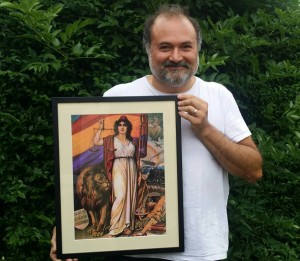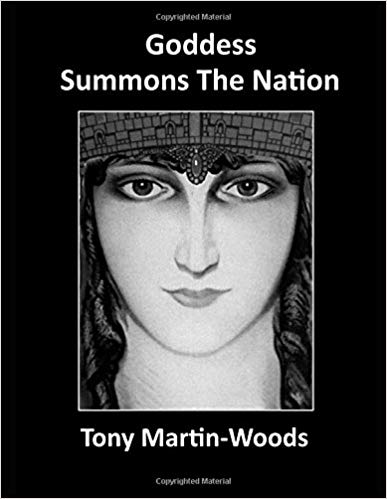Goddess Summons the Nation Paperback
Goddess Summons the Nation Kindle Edition

Goddess summons the Nation
a book of poems written with the vocation of songs and minstrelsy, articulated in four chapters with revealing titles, Substructure, Superstructure, Demolition and Flowers. Full of irony, the poetic voice, which is an ethical, indignant voice, wants the written script to transcend in spoken writing (The grapes / don’t die / in the vineyard / with the harvest / in the summer. // They transcend / and translive / victorious / in the wine, // like the poem in the song … ). This book talks to the reader in short, concise verses, with lexicon of the perspective of one who stands on the brink of historical abyss (The West bleeds to death /…). To paraphrase Ezra Pound, this book has style, that is to say, limpidity, as opposed to rethoric; where the poet in dealing with his own time, sees that language does not petrify in his hands; he has prepared for new advances along the lines of true metaphor, that is interpretative metaphor, or image, as diametrically opposed to untrue or ornamental metaphor. These poems daringly address Brexit and Trump, the policy of closing borders and xenophobia, and a nation that appears personified in female allegories – I am the matriot / the highest patriot / I serve my shares / I sooth my country /…, and cyborgs who leave a planet in ruins ( his brain compressed in a zip folder / stored in a private cloud // No memories / just data / …), our own planet from which figs also flee (with millions of figs like me, like you / away from a supernova / of stupid national greed / … ). In one poem, Time to leave Brexit, we can also read the condensed intention of the book: I’ve never been an island, / Nor a chunk of it. / I could never be one / Cause I’m a social being / made of flesh / And emotions. Images of flesh and bone, and emotions that readers will share.
Editor’s Note: see also Artvilla.com Goddess Summons the Nation. By Tony Martin Woods.
Goddess summons the Nation
un poemario escrito con vocación de cancionero y de mester de juglaría, articulado en cuatro capítulos con títulos reveladores, Substructure, Superstructure, Demolition y Flowers. Pleno de ironía, la voz poética, que es una voz ética, indignada, y que pretende que la escritura escrita trascienda en la escritura hablada (The grapes/don´t die/in the vineyard/with the harvest/in the summer.// They transcend/and translive/victorious/in the wine,// like the poem in the song/…). Se interpela al lector en versos breves, concisos, con léxico de nuestro tiempo y una temática actual de quien se sitúa al borde del abismo histórico (The West bleeds to death/…). Parafraseando a Ezra Pound, este es un libro con “style, that is to say, limpidity, as opposed to rethoric”, donde el poeta “in dealing with his own time, sees to it that language does not petrify in his hands; he has prepared for new advances along the lines of true metaphor that is interpretative metaphor, or image, as diametrically opposed to untrue or ornamental metaphor”. Los poemas se atreven con el Brexit, con Trump, con la política de cierre de fronteras y xenofobia, con una nación que aparece personificada en alegorías femeninas – I am the matriot/ the highest patriot/ I serve my shares/ I sooth my country/, y con cíborgs que abandonan un planeta en ruinas (his brain compressed in a zip folder/stored in a private cloud// No memories/just data/…), planeta del que también huyen los higos ( with millions of figs like me, like you/ away from a supernova/of stupid national greed/…). En uno de sus poemas, Time to leave Brexit, también podemos leer la intención condensada del libro: I´ve never been an island,/Nor a chunk of it./ I could never be one/Cause I´m a social being/made of flesh/And emotions… Imágenes de carne y hueso, y emociones que compartirán lectores y lectoras.

Antonio Martínez Arboleda:
Antonio (Tony Martin-Woods) started to write poetry for the public in 2012, at the age of 43, driven by his political indignation. That same year he also set in motion Poesía Indignada, an online publication of political poetry. He runs the poetry evening Transforming with Poetry at Inkwell, in Leeds, and collaborates with 100 Thousands Poets for Change100tpc.org/. Tony is also known in the UK for his work as an academic and educator under his real-life name, Antonio Martínez Arboleda at the University of Leeds. His project of digitisation of poetry, Ártemis, compiles more than 100 high quality videos of Spanish poets and other Open Educational Resources. http://www.artemispoesia.com/ . He is the delegate in the UK of Crátera Revista de Crítica y Poesía Contemporánea , where he also publishes his work as translator from English into Spanish. He published his first volume of poetry in Spanish, Los viajes de Diosa (The Travels of Goddess), in 2015, as a response to the Great Recession, particularly in Spain. His second book, Goddess Summons The Nation, is a critique of the ideas of nation and capitalism, mainly in the British Brexit context. It incorporates voices of culprits, victims and heroes with mordacity and rhythm. It consists of 21 poems, 18 of which are originally written in English. It is available in print and kindle in Amazon and other platforms. Editor’s note: further information bio & academic activities can be found at this link: https://ahc.leeds.ac.uk/languages/staff/91/antonio-martinez-arboleda

Amparo Arrospide (Argentina) is a Spanish poet and translator. She has published seven poetry collections, Mosaicos bajo la hiedra, Alucinación en dos actos algunos poemas, Pañuelos de usar y tirar, Presencia en el Misterio, En el Oido del Viento, Hormigas en Diáspora and Jaccuzzi, as well as poems, short stories and articles on literary and film criticism in anthologies and in both national and foreign magazines. She has received numerous awards. Editor’s Note: see also Poetry, National Literature Prize 2018, Francisca Aguirre, Translated from Spanish by Amparo Arróspide & Robin Ouzman Hislop


